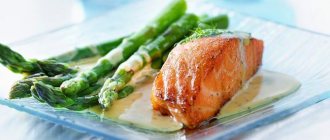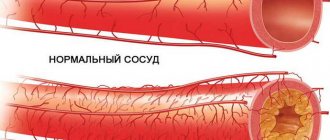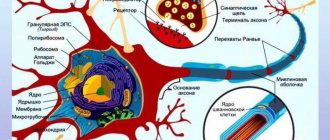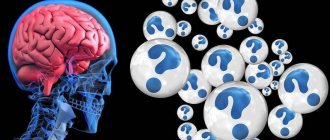Inhibited reactions, impaired concentration, and weakened memory force you to go to a neurologist for a prescription for brain stimulants. Once a person has stimulated the body with the help of pharmacological agents, it deprives it of the ability to cope with difficulties on its own. Therefore, from time to time you will have to spend money on Neuromultivit and similar drugs.
But you can improve the functioning of neurons with proper nutrition. If you purposefully formulate a daily diet from certain foods, you can improve mental performance, speed of reactions and calculations, increase concentration and memory, reduce fatigue and the adverse effects of stress. Scientists have proven a direct connection between the food a person eats and the efficiency of the brain.
Products useful for the human brain and cerebral vessels
The human nervous system, where the brain acts as the “Central Computer of the system,” is complex. In addition to the brain, this system includes the spinal cord and all human nerve endings. And the human brain itself is a complex structure, consisting of blood vessels and nerve cells. This entire system requires a special approach, especially in nutrition.
This is a food that helps strengthen and dilate blood vessels in the brain.
- Water. The main product for good brain activity, for its blood vessels. Dehydration of this organ leads to serious damage to all its functions. Water is the healthiest product for the brain.
- Polyunsaturated fatty acids, Omega-3. They have an excellent effect on memory, take part in metabolism in the brain, and lower cholesterol levels. These substances are found in fatty fish.
- Choline and lecithin. They help produce aticel - choline, which is necessary for long-term brain function. Likewise, they are found in fatty fish.
- Complex carbohydrates. They provide uninterrupted nutrients to human brain cells, as they are slowly digested. Contained in cereals, corn, bean pasta, vegetables, bread, and wholemeal flour. These are useful products for the blood vessels of the brain.
- Amino acids. Supports a clear mind and increases speed of thinking. Contained in beans.
- Magnesium and folic acid. Dilate blood vessels and stabilize the functions of the human brain. Contained in beets. In addition, beets also contain substances that destroy enzymes, which can subsequently cause Alzheimer's disease. Similar substances are present in cabbage.
- B vitamins. Strengthen the activity of the brain functions responsible for processing information, participating in research activities. Positively affects the nervous system.
- Manganese. Manganese is constantly required for mental work. Contained in tomatoes. Tomatoes also contain the antioxidant lycopene, which stimulates blood circulation as it helps saturate the brain with oxygen. In addition, tomatoes have a negative effect on blood clots. Thus, tomatoes are among the foods that are beneficial for blood circulation in the brain.
- Vitamin K. Slows down the aging of the human brain, as it helps brain activity and supports cognitive function. Contained in broccoli. And Brussels sprouts increase concentration. Thus, Brussels sprouts and broccoli are foods that are good for brain activity.
- Iron. Supports cognitive and mental functions of the brain. Contained in apples.
- Antioxidants that increase the elasticity of veins and arteries, preventing the formation of plaques. Contained in cranberries. Cranberries also supply nerve cells with nutrients and oxygen.
- Antioxidants that have a positive effect on capillary blood circulation in the brain. Present in blueberries and blueberries, which additionally contain minerals and vitamins that improve brain function and vision. They also contain Omega-3. Blueberries and blueberries are foods that are good for cerebral circulation.
- Choline. Improves memory function, relieves fatigue, and helps the membranes of the human brain function. Present in eggs.
- Antioxidant flavanol. Stabilizes blood circulation in the brain. Present in cocoa beans, which also contain catechins, flavonids, antioxidants, which are necessary for good brain function.
- Glucose. Glucose is necessary to nourish brain cells. Contained in fruits and dried fruits. Fruits and dried fruits are foods that are good for the brain, as well as its attention and memory functions.
- Sulfur. Helps saturate the brain with oxygen. Contained in: cucumbers, garlic, figs, cabbage, almonds, gooseberries, carrots, strawberries, pork, onions, potatoes, radishes. All of these foods are healthy foods for brain function.
We suggest you familiarize yourself with the Salt-free diet of fish and boiled vegetables
Menu for vegetarians
| Breakfast | Snack | Dinner | Afternoon snack | Dinner | |
| Monday | Oatmeal with poppy seed milk and almonds | Apple, 20 g sunflower seeds | Soup with vegetables, tofu and nori | Whole grain sandwich with spinach and carrots | Falafel with yogurt sauce |
| Tuesday | Burrito with avocado and tomato | Smoothie with banana and berries | Wholemeal spaghetti with beans in tomato sauce | Celery and carrot sticks | Chickpeas with eggplant |
| Wednesday | Casserole with kiwi and banana | Granola low-fat yogurt | Soup with mushrooms and barley | Seaweed with sesame | Cabbage cutlets with buckwheat |
| Thursday | Bran pancakes with berry sauce | Apple with peanut butter and raisins | Pilaf with chickpeas | Salad with quinoa, celery and bell pepper | Vegetable casserole of broccoli and zucchini with herbs |
| Friday | Baked pear with oat flakes in honey | Sandwich with mushrooms and pumpkin | Lentils with champignons | Sun-dried tomatoes with a slice of bread | Chinese cabbage stewed with peas and soy sauce |
| Saturday | Porridge with coconut milk | Garlic salad with beets and prunes | Pumpkin soup with onions and nuts | Salad with celery and apple | Pita with chickpea meatballs |
| Sunday | Carrot cake with coconut | Apple, orange, handful of nuts | Pasta with pumpkin and capers | Green beans with sesame seeds | Couscous with avocado and spices |
DETAILS: Periarthritis of the knee joint - diagnosis and treatment
Products useful for the functioning of the human brain
To achieve anything, you need constant training. For a slim body, you need constant physical activity. Or, for example, to play a musical instrument, you need to practice every day. It's exactly the same with the human brain. To develop it, constant training, problem solving, and reading books are required.
- Phosphorus. Phosphorus is a material for the construction of human brain cells. (Cauliflower, cucumber, celery, radishes, beans, walnuts, soybeans.) Foods containing phosphorus are good for the brain.
- Sulfur. For the normal functioning of brain cell function, oxygen saturation is required. (Carrots, cucumbers, cabbage, figs, garlic, potatoes, onions)
- Calcium. It is required for the good process of hematopoiesis, protects against infection, and prevents microorganisms that cause diseases from entering the blood. (Grapes, almonds, apples, oranges, green vegetables, cucumbers, carrots, cherries, cabbage, beets, peaches, apricots, pineapple, whole grains, strawberries.) These are the healthiest foods for the brain.
- Iron. An element necessary for life processes in brain tissue, helps maintain the necessary balance of hemoglobin in the blood and normal blood composition. (Rice, beans, shellfish, tomatoes, pineapples, cabbage, peas, cherries, oranges, mustard, green vegetables.)
- Magnesium. Required for the prevention of nervous diseases and good functioning of the nervous system. Magnesium prevents the occurrence of insomnia, headaches, anxiety, and restlessness. (Peanuts, pumpkin, potatoes, plums, almonds, mint, chicory, lettuce, whole wheat grains, olives, walnuts.) Foods containing magnesium are beneficial for brain activity.
- Vitamins of group E and group B. (Melon, grapefruit, avocado, bananas, nuts, lard leaves, wheat germ, nuts, spinach, cabbage, oranges, polished rice, mustard seeds, dry beans are the most useful foods for improving brain function.)
- To enrich human brain cells, oxygen is necessary, and to maximize the enrichment of cells with oxygen, you should eat certain foods (Tomatoes, onions, radishes, potatoes, mint, horseradish, parsley are the most beneficial foods for brain function.)
Antioxidants
What it is? These are microelements that rid the body of free radicals that cause stress. Usually, after improper nutrition, they enter the nerve fibers, causing depression. Due to the fact that the diet contains antioxidants, excessive brain activity goes away, and there are no age-related irreversible disorders.
Here are four types of foods that relieve stress:
- Fruits and berries. We are talking about blueberries, blackberries, red apples, cherries, raspberries, plums, strawberries, lingonberries, oranges.
- Vegetables. Let's talk about ginger, garlic, red cabbage, spinach, broccoli, red bell pepper, potatoes, tomatoes, onions.
- Nuts. We're talking about walnuts, hazelnuts and pecans.
- Cereal products. We are talking about oatmeal, whole wheat, brown rice.
Healthy heart - healthy brain
Glucose is one of the vital nutrients for the body. Its deficiency can lead to brain exhaustion and, as a result, fatigue, various nervous disorders and stress. First of all, this applies to adherents of strict diets. The most useful source of glucose is dried fruits, in particular dried apricots. It is rich in iron, necessary for the fruitful functioning of the brain. Vitamin C, in turn, helps it be better absorbed. In addition, dried apricots dilute blood clots in blood vessels, lower cholesterol levels and minimize the risk of heart attack.
What foods are good for brain recovery?
After overwork, concussion or stroke, restoration of the human brain and nervous system is required, in addition to rest and medications, you need to adhere to a special nutritional system that helps a speedy recovery. Since a person usually remains in bed during treatment, it is necessary to eat easily digestible foods.
- Foods that contain B vitamins (legumes: peas and beans; nuts, asparagus, oysters, fish, liver, pork, milk, egg yolk, whole grain bread, buckwheat, brewer's yeast). B vitamins have a good effect on the functioning of the nervous system.
- Products that contain iron (buckwheat, wheat, oatmeal, barley, poultry meat: chicken, pigeon; liver, legumes: peas, beans; dogwood, spinach). Iron helps the B vitamins to be absorbed as much as possible.
- Products containing lecithin (poultry meat: chicken, pigeon; soybeans, eggs, liver). Lecithin has a good effect on brain activity.
- Products containing polyunsaturated acids, Omega-3 (fish).
- Foods that contain vitamin C (rose hips, sweet peppers, black currants, citrus fruits, honeysuckle, cabbage, spinach, rowan, viburnum). Vitamin C has a positive effect on the entire body, helping it cope with stress.
- Products containing magnesium (seaweed, buckwheat, barley, various types of nuts, legumes: peas, beans; millet, oatmeal). Magnesium helps normalize brain function. Thus, it is clear which foods are beneficial for brain development.
- Products containing glucose (dried fruits and honey). Glucose is required for brain cell activity.
- Foods enriched with fats (nuts, vegetable oils.)
- Foods that contain calcium (milk, dairy and fermented milk products). Calcium improves immunity and improves metabolism in the body. So, it becomes clear which foods are good for the human brain.
- Foods that contain potassium (raisins, legumes: peas, beans; nuts of various types, prunes, seaweed, dried apricots, baked potatoes, dairy products).
We invite you to familiarize yourself with the Diet for dysmetabolic nephropathy
Squirrels
Special brain hormones - neurotransmitters synthesized by amino acids - are responsible for controlling the main functions of the central nervous system (motor, emotional, sensations of pain and pleasure). They are also responsible for sleep activity, control the appetite center, influence intellectual activity, mnestic activity, and improve mood. Protein-rich foods promote the supply of amino acids to the body: meat, fish, dairy products, eggs, legumes, nuts, seeds, leafy green vegetables.
Useful foods for the human nervous system
The human nervous system is a very delicate and complex structure. It protects the human body from the influence of harmful factors of the external and internal environment. For the normal functioning of the nervous system, many rules must be followed. This includes adhering to a special nutritional system and eating foods that are not harmful to the nervous system. So what foods are good for the nervous system?
- Products containing phosphorus. Phosphorus reduces muscle tone and supports the nervous system. Phosphorus is found in liver, brain, various cereals, legumes, tongue and dairy products.
- Products containing iron. Iron is responsible for a clear and quick mind. Products containing iron include: buckwheat, seafood, beef, liver, spinach, white cabbage, turnip, melon.
- Products that contain calcium. Calcium helps transmit impulses in muscles and nerves. This group of products includes legumes, beets, almonds, dairy products, cabbage.
- Products containing magnesium. Magnesium relaxes muscles and is responsible for the two-way exchange of nerve impulses. Products containing magnesium - legumes, nuts, mineral water, various cereals, egg yolk, bran.
- Products containing potassium. Since potassium ensures stable functioning of the heart, as well as muscles and nerves. Products of this kind include: vegetables, fruits, millet.
- Products containing iodine. Iodine improves memory, ensures normal, uninterrupted functioning of the thyroid gland, and is responsible for regulating the entire hormonal balance. Products containing iodine - seaweed, shrimp, oysters, sea fish. So what foods are good for your brain and memory? These are products containing iodine.
- Food containing vitamin A. Vitamin A normalizes sleep and protects nerve cells from damage caused by free radicals. This group of products includes legumes, vegetables, fruits, green leafy vegetables, nuts, carrots, fish oil. Thus, it is clear which foods are beneficial for brain activity.
- Products containing vitamin C. Vitamin C protects nerve cells from toxins and promotes the production of stress-fighting hormones. Red pepper, rose hips, strawberries, black currants are foods containing vitamin C.
- Food containing vitamin E. Vitamin E has a calming effect and neutralizes stress. This group of products includes sprouted wheat, almonds, hazelnuts, spinach, fried eggs, and legumes.
- Foods that contain B vitamins. B vitamins improve the body’s ability to withstand stress, help relieve psycho-emotional overload, and are responsible for protein metabolism. Porridge, fruits, vegetables, black bread are products containing B vitamins.
- Products containing fiber. Fiber stimulates the elimination of toxins from the body. This group of products includes cereals and grains.
- Products containing lecithin. Since lecithin maintains cholesterol in a dissolved state, necessary for nerve cells. In addition, lecithin contains fatty acids and phospholipids. Products containing lecithin - wheat germ, egg yolk, citrus fruits, sunflower seeds.
- Products containing glucose. Glucose is the main food for nerve cells, maintains the desired balance of blood sugar, and reduces the feeling of anxiety. Products containing glucose include: potatoes, grapes, lettuce, fruits, unrefined bread grains, raspberries, cherries, honey, raisins. So, it becomes clear what foods are good for brain function.
We invite you to familiarize yourself with Athletic gymnastics with weights
Water to improve memory
The fact that the human body consists of 60% water is known to many. However, not everyone pays due attention to the daily supply of the body with the necessary moisture from within.
Iron is found in meat, internal organs, legumes and nuts. For their part, crustaceans, lamb and legumes are foods rich in zinc. Garlic and soy lecithin are also very healthy and beneficial. Seaweed will help us avoid hypothyroidism and the accumulation of heavy metals, which can also cause intellectual decline.
The latter is very important for counteracting stress and strengthening intellectual agility. Smokers should increase their vitamin C intake, as the average smoker reduces levels by 20% and heavy smokers by 40%. Eggs, oats, beans and peas. They are rich in phosphorus and other nutrients. To prevent fat from building up in your arteries, you should eat high-fiber foods and fruits, which help lower cholesterol levels. Regular consumption improves blood circulation and the brain is better nourished. Foods - such as beef, chicken, fish - are complete and contain all the essential amino acids. Plant proteins do not contain all the essential amino acids. Dry beans, whole grains, brewer's yeast, and dried legumes contain copper. . The contribution that a single nutrient can provide will likely not be beneficial enough to compensate for a diet of poor nutritional quality.
- We are not talking about carbonated drinks, tea and coffee. They should not replace drinking regular plain water.
- Dehydration negatively affects the functioning of almost all organs of the body, both internally and externally, worsening the overall well-being and appearance of a person.
- Water is also important for brain cells. Lack of fluid can lead to disruptions in the areas of the brain responsible for memory and logical thinking.
- A number of studies have proven that regular drinking water can activate mental activity, while the feeling of thirst, on the contrary, has demonstrated the opposite effect of slowing down brain reactions
IMPORTANT: To maintain cognitive abilities at a high level, do not forget to drink plain water without any additives every day at the rate of 30-40 ml per kg of weight.
Smart cereals
It's no secret that whole grains are faithful allies of those losing weight. But not everyone knows that they are still friends with the brain. Folic acid, found in bran, wheat, oatmeal, brown rice and barley, stimulates blood flow to the brain, thereby saturating it with oxygen and nutrients. In addition, thiamine (vitamin B1) present in these products significantly improves memory. Therefore, whole grains are especially useful for those over 60. However, prevention at any age is never superfluous.
Nuts for memory
- The most prominent representative of nuts for stimulating brain activity is walnut
- Regular consumption of this nut can significantly increase the speed of information processing, increase the brain's response, and improve the ability to remember large amounts of information.
- The benefits of nuts are obvious due to the rich composition of vitamins and microelements
- Nuts can even replace meat in terms of nutritional value. Despite their high calorie content, the fats they contain are easily absorbed by the body.
- Therefore, moderate consumption of these gifts of nature is very useful for both older people and all those who have a predisposition to atherosclerosis or signs of cognitive decline
IMPORTANT: It is enough to eat 3-4 nuts per day, but no more than 10 per day.
Vitamin Champion
Unprepossessing at first glance, spinach leaves have an inexhaustible supply of nutrients. The combination of vitamins B6 and B12 with folic acid is the best cocktail for the brain that will help train excellent memory. Regular consumption of this green vegetable will prevent premature aging of brain cells and will be a good prevention of Alzheimer's disease. In addition, spinach is rich in iron, the lack of which, among other ailments, is fraught with cognitive impairment.
What should you avoid?
Not all drinks are beneficial for human brain health. Its activity can be disrupted by drinking large amounts of alcohol (especially beer), energy drinks, and even sweet water.
The result of chronic drunkenness is a disruption of communication between brain neurons and the occurrence of Wernicke-Korsakoff syndrome . It causes memory problems, mental confusion, eye paralysis and lack of muscle coordination. We talked more about the effects of alcohol on the brain in a separate article.
Excessive consumption of energy drinks sharply increases blood pressure and can lead to a hypertensive crisis. The danger of large amounts of consumption of sweet water lies in provoking the development of Alzheimer's disease, diabetes and obesity . In the cerebral cortex, abnormal proteins accumulate in toxic plaques. Healthy cells stop working and die.
Drink for smart people
Dark chocolate rich in cocoa beans is the perfect treat for an overworked brain. A third of a chocolate bar a day will perfectly invigorate the brain and charge it with fresh strength. Flavonoids will ensure blood flow to the brain, and magnesium will take care of memory. A number of interesting studies have shown that those who drank a cup of hot chocolate coped with complex math problems faster than those who were left without the sweet dope. In addition, fans of this delicacy are less susceptible to seasonal depression.
Tea wisdom
A cup of green tea in the morning is not only a healthy alternative to coffee, but also a generous portion of cahetins. Their lack creates a feeling of powerlessness and emptiness, familiar to almost every person, combined with ineradicable laziness. The powerful antioxidants cahetins help in the fight against this scourge. On the one hand, they actively stimulate mental activity, on the other, they allow the brain to quickly switch to a gentle mode and avoid overload. In short, this is an excellent recharge of energy at any time of the day.
Grief comes not only from the mind, but also from a weakened brain. So take care of it every day. A list of the healthiest foods for the brain will help you.
Approximate menu for a man
According to experts, a healthy diet for a man should look like this:
- Breakfast. A few fried or boiled eggs with herbs, a piece of grain bread, tea or coffee. It's better if you can do without consuming sugar. It can be replaced with honey.
- Lunch. A glass of milk, yogurt, or cottage cheese.
- Dinner. Be sure to have a hot dish (borscht, soup). Garnish with fish. Vegetable salad with vegetable oil. As a dessert, you can use biscuits or dried fruits.
- Afternoon snack. It is enough to eat fruits: orange, pears, apples.
- Dinner. Chicken breast, cutlet or beef with vegetable side dish. Tea again without sugar. Drink kefir or fermented baked milk before bed.
Naturally, this is only an approximate list of healthy male nutrition, and a detailed program for each day should be drawn up based on the capabilities of a particular organism.











